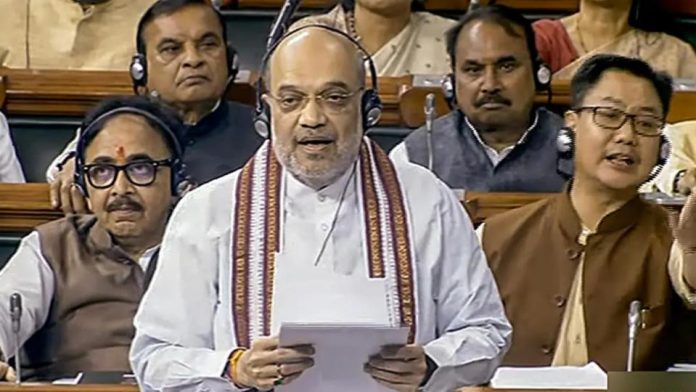Union Home Minister Amit Shah unveiled a trio of bills in the Lok Sabha today, marking a significant move to revamp the country’s criminal justice system. The proposed legislation seeks to replace the Indian Penal Code (IPC), the Code of Criminal Procedure (CrPC), and the Indian Evidence Act. In presenting these bills, Shah emphasized the government’s objective of ensuring “justice, not punishment”.
The bills, named the Bharatiya Nyaya Sanhita, 2023, the Bharatiya Nagarik Suraksha Sanhita, 2023, and the Bharatiya Sakshya Bill, 2023, will now undergo detailed examination by a parliamentary panel.
Shah highlighted the critical shift in focus from punitive measures to the dispensation of justice. He highlighted that the current laws were designed to serve the interests of the British administration and primarily aimed at punishment. The new legislative framework, however, intends to safeguard the rights of Indian citizens and prioritize justice over retribution.
He stressed, “The intent of the new laws will not be punitive; instead, they will be centered on delivering justice.” Shah further explained that while punishments would remain integral to deter crime, the primary emphasis would be on addressing the root causes and ensuring the fair treatment of individuals within the criminal justice system.
Repeal of Sedition Law
A notable aspect of Shah’s announcement was the repeal of the sedition law, which has been a topic of debate in recent times. The new legal framework introduces Section 150, which focuses on acts endangering the sovereignty, unity, and integrity of India. This provision encompasses various forms of expression, including spoken and written words, electronic communication, or any means that promote secession, rebellion, subversive activities, or separatist sentiments.
The new law suggests severe penalties for such actions, including life imprisonment or imprisonment of up to seven years, accompanied by fines.
Capital Punishment for Mob Lynching:
A significant proposal brought forward by Shah is the inclusion of capital punishment for mob lynching cases. The provision states that when a group of five or more individuals collectively commits murder based on factors like race, caste, community, gender, or personal beliefs, each member of the group will face death penalty or imprisonment for life, with a minimum of seven years’ imprisonment and fines.
Stricter Punishments for Rape:
The proposed bills also entail modifications to the punishment structure for rape cases. Notably, the death penalty could be imposed for the rape of minors. The term ‘life imprisonment’ is redefined as ‘imprisonment for natural life.’ The new law advocates rigorous imprisonment of not less than ten years, extendable to imprisonment for the remainder of the offender’s natural life, along with fines. The bills also include provisions for punishing those who disclose the identity of rape survivors.

